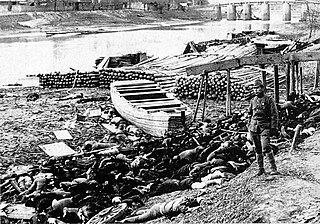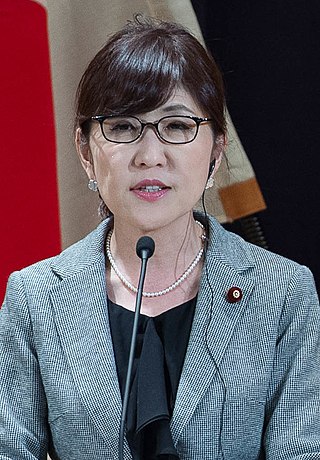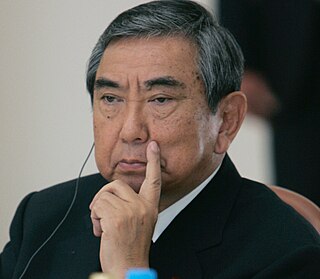Related Research Articles

There have been a number of significant disputes between various Koreanic and Japonic states. The two regions have a long history of relations as immediate neighbors that has been marked with conflict. One of the most significant issues is the Japanese colonization of Korea that began with the Japan–Korea Treaty of 1910 and ended with the surrender of Japan at the end of World War II.

Comfort women were women and girls forced into sexual slavery by the Imperial Japanese Armed Forces in occupied countries and territories before and during World War II. The term comfort women is a translation of the Japanese ianfu, a euphemism that literally means "comforting, consoling woman". During World War II, Japanese troops forced hundreds of thousands of women from Australia, Burma, China, the Netherlands, the Philippines, Japan, Korea, Indonesia, East Timor, New Guinea and other countries into sexual enslavement for Japanese troops; however, the majority of the women were from Korea. Many women died due to brutal mistreatment and sustained physical and emotional distress. After the war, Japan denied the existence of comfort women, refusing to provide an apology or appropriate restitution, which damaged Japan's reputation in Asia for decades. Only in the 1990s did the Japanese government begin to officially apologize and offer compensation. However, apologies from Japanese officials have been criticized as insincere, and Japanese government officials have continued to deny the existence of comfort women.

During its imperial era, the Empire of Japan committed numerous war crimes and crimes against humanity across various Asian-Pacific nations, notably during the Second Sino-Japanese and Pacific Wars. These incidents have been referred to as "the Asian Holocaust", and "Japan's Holocaust", and also as the "Rape of Asia". The crimes occurred during the early part of the Shōwa era, under Hirohito's reign.

The Murayama Statement was a political statement released by former Prime Minister of Japan Tomiichi Murayama on August 15, 1995, officially titled "On the Occasion of the 50th Anniversary of the War's End".

Shinzo Abe was a Japanese statesman and politician who served as the prime minister of Japan and president of the Liberal Democratic Party (LDP) from 2006 to 2007 and again from 2012 to 2020. He was the longest-serving prime minister in Japanese history, serving for almost nine years in total. Abe also served as Chief Cabinet Secretary from 2005 to 2006 under Junichiro Koizumi and was briefly the opposition leader in 2012.
Yūto Yoshida was a Japanese novelist and member of the Japanese Communist Party. He has published under a variety of pen names, including Seiji Yoshida, Tōji Yoshida, and Eiji Yoshida. He wrote "My war crimes", which is the origin of a dispute over comfort women 30 years after World War II; he admitted that portions of his work had been made up in an interview with Shūkan Shinchō on May 29, 1996. Later, his fictional work was used by George Hicks in his "The Comfort Women: Japan's Brutal Regime of Enforced Prostitution in the Second World War".
Yoshiaki Yoshimi is a professor of Japanese modern history at Chuo University in Tokyo, Japan. He is a founding member of the Center for Research and Documentation on Japan's War Responsibility.

Hirokazu Matsuno is a Japanese politician who served as the Chief Cabinet Secretary from October 2021 until December 2023. He is serving in the House of Representatives as a member of the Liberal Democratic Party.

Tomomi Inada is a Japanese lawyer and politician serving as a member of the Japanese House of Representatives, representing the 1st Fukui Prefecture since September 2005. She previously served as the 14th Japanese Minister of Defense from August 2016 to July 2017, resigning in response to a cover up scandal within the Japanese Ministry of Defense. She spent time as the Chairwoman of the Policy Research Council of the Liberal Democratic Party in her fourth term as a member of the House of Representatives in the Diet. She is a native of Fukui Prefecture.

Hakubun Shimomura is a Japanese politician of the Liberal Democratic Party (LDP), a member of the House of Representatives in the Diet.

Wednesday demonstration, officially named Wednesday Demonstration demanding Japan to redress the Comfort Women problems, is a weekly protest in South Korea which aims at obtaining justice from the Japanese government regarding the large scale sexual slavery system established under Imperial Japan rule during World War II. The weekly protest is held in the presence of surviving comfort women on every Wednesday at noon in front of the Embassy of Japan in Seoul.

The Kono Statement refers to a statement released by Chief Cabinet Secretary Yōhei Kōno on August 4, 1993, after the conclusion of the government study that found that the Japanese Imperial Army had forced women, known as comfort women, to work in military-run brothels during World War II. The Japanese government had initially denied that the women had been coerced until this point. In the Kono Statement, the Japanese government acknowledged that:
Events from the year 1991 in South Korea.
Lee Yong-soo is a former comfort woman from South Korea. Lee was forced to serve as a comfort woman during World War II by the Imperial Japanese Army. She is one of the youngest comfort women still living.
The Korean Council for the Women Drafted for Military Sexual Slavery by Japan is a Korean non-governmental organization advocating the rights of the surviving comfort women and lobbying the Japanese government to take actions of a full apology and compensation.
The Peace Monument of Glendale is an exact replica of the original memorial dedicated to comfort women, the Statue of Peace. The statue is located in Central Park near the Glendale Public Library in Glendale, California, United States. The Glendale Peace Monument was funded and built in 2013 by the Korean American Forum of California, a non-profit human rights organization. The installation of the memorial happened shortly after Toru Hashimoto, former mayor of Osaka, Japan, expressed that comfort women were necessary to maintain discipline within the Japanese army during World War II. The unveiling of the statue was also considered a celebration due to the passing of a 2007 United States House of Representatives resolution, which urged the Japanese government to accept responsibility for their wartime crimes.
Comfort Women: A New Musical is a musical about the Korean comfort women who were sold as sex slaves for the Imperial Japanese Army during World War II. It is written and directed by Dimo Hyun Jun Kim, a South Korean theater director.
Comfort Women Memorial Peace Garden is a memorial to the World War II comfort women, which is located at the Fairfax County Government Center in Fairfax County, Virginia.
The Japan–South Korea Comfort Women Agreement declared that the issue of the comfort women between Japan and South Korea was to be resolved finally and irreversibly. The agreement was announced by the Foreign Ministers of both countries and confirmed by the Prime Minister of Japan and the President of South Korea by a telephone call on 28 December 2015. In 2019, the agreement had been effectively shelved.
References
- 1 2 3 4 5 "Washington Coalition for Comfort Women Issues". Archived from the original on 8 October 2015. Retrieved 30 October 2015.
- 1 2 "The future of the 'Comfort Women' movement in Korea". The Washington Times . Retrieved 1 December 2015.
- ↑ "H. RES. 121" . Retrieved 1 December 2015.
- 1 2 3 4 "Fairfax County's New Comfort Women Memorial Courts Controversy". 16 July 2014. Retrieved 1 December 2015.
- ↑ "70 years later, a Korean "comfort woman" demands apology from Japan". The Washington Post . Retrieved 1 December 2015.
- 1 2 "Protesters Push Japanese PM Shinzo Abe on Plight of WWII 'Comfort Women'". US News & World Report. 29 April 2015. Retrieved 15 July 2023.